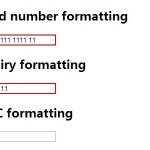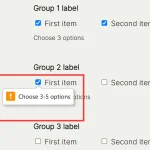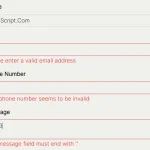| Author: | yairEO |
|---|---|
| Views Total: | 10,623 views |
| Official Page: | Go to website |
| Last Update: | July 24, 2021 |
| License: | MIT |
Preview:

Description:
A fast, cross-browser, user-friendly, highly customizable form validator that works with the native HTML5 input types: text, email, url, date, etc.
More features:
- Custom trigger event: blur, click, change, etc.
- Allows you to validate form fields using custom regex.
- Pretty and interactive feedbacks for invalid form fields.
- Supports multi fields. Suitable for credit card form validation.
- With no dependencies.
How to use it:
1. Load the validator.js script into the document.
<script src="validator.js"></script>
2. Load the multifield.js if you’d like to validate a form field containing multiple inputs.
<script src="multifield.js"></script>
3. Disable the native HTML5 data validation on your form.
<form action="" method="post" novalidate> ... </form>
4. Apply validators to the form fields using the following attributes:
- required: is required?
- pattern: ‘numeric’, ‘alphanumeric’, ‘url’, ‘phone’, ’email’, or custom regex.
- data-validate-words: Specify the minimum amount of words for this field.
- data-validate-length: Specify the length allowed for the field (after trim). For example: [3,10] means that the field can only have 3 or 10 characters.
- data-validate-length-range: Specify the minimum and/or maximum number of chars in the field (after trim).
- data-validate-linked: Specify the field which the current field’s value (the attribute is set on) should be compared to.
- data-validate-minmax: Specify the minimum and/or maximum value.
<span>Name</span> <input data-validate-length-range="6" data-validate-words="2" name="name" required="required" /> <span>Occupation</span> <input data-validate-length-range="5,15" name="occupation" type="text" /> <span>Email</span> <input name="email" required="required" type="email" class="email" /> <span>Confirm Email address</span> <input data-validate-linked="email" type="email" class='email' name="confirm_email" required="required"> <span>Number</span> <input data-validate-minmax="10,100" type="number" name="number" required='required'>
5. Initialize the form validator on the form element and done.
var validator = new FormValidator({
// options here
});6. Validate the form on submit (OPTIONAL).
document.forms.onsubmit = function(e){
var submit = true,
validatorResult = validator.checkAll(this);
console.log(validatorResult);
return !!validatorResult.valid;
};7. Default settings to config the form validator.
var validator = new FormValidator({
// shows alert tooltip
alerts : true,
// custom trigger events
// e.g. ['blur', 'input', 'change']
events : false,
// predefined validators
regex : {
url : /^(https?:\/\/)?([\w\d\-_]+\.+[A-Za-z]{2,})+\/?/,
phone : /^\+?([0-9]|[-|' '])+$/i,
numeric : /^[0-9]+$/i,
alphanumeric : /^[a-zA-Z0-9]+$/i,
email : {
illegalChars : /[\(\)\<\>\,\;\:\\\/\"\[\]]/,
filter : /^.+@.+\..{2,6}$/ // exmaple email "[email protected]"
}
},
// default CSS classes
classes : {
item : 'field',
alert : 'alert',
bad : 'bad'
}
});8. Default error messages.
texts : {
invalid : 'inupt is not as expected',
short : 'input is too short',
long : 'input is too long',
checked : 'must be checked',
empty : 'please put something here',
select : 'Please select an option',
number_min : 'too low',
number_max : 'too high',
url : 'invalid URL',
number : 'not a number',
email : 'email address is invalid',
email_repeat : 'emails do not match',
date : 'invalid date',
time : 'invalid time',
password_repeat : 'passwords do not match',
no_match : 'no match',
complete : 'input is not complete'
},Changelog:
v3.4.0 (07/24/2021)
- Bugfixes










